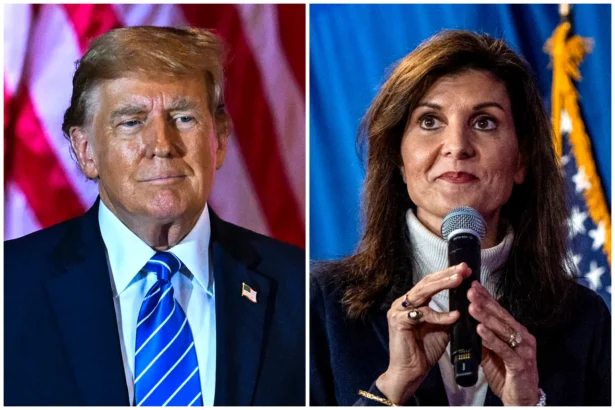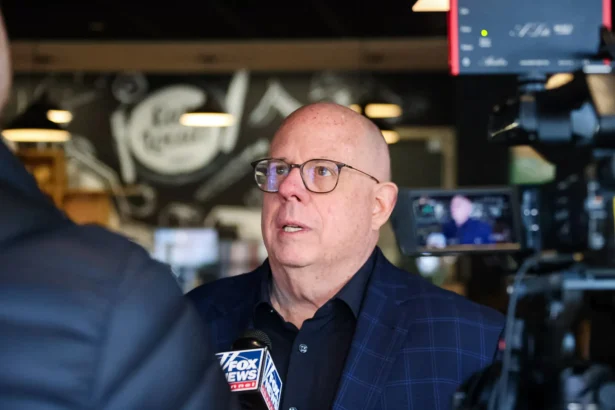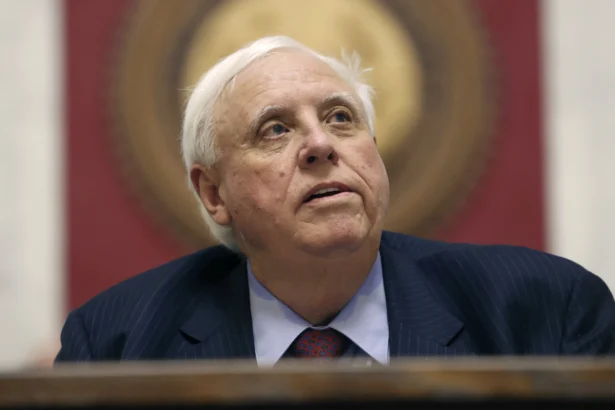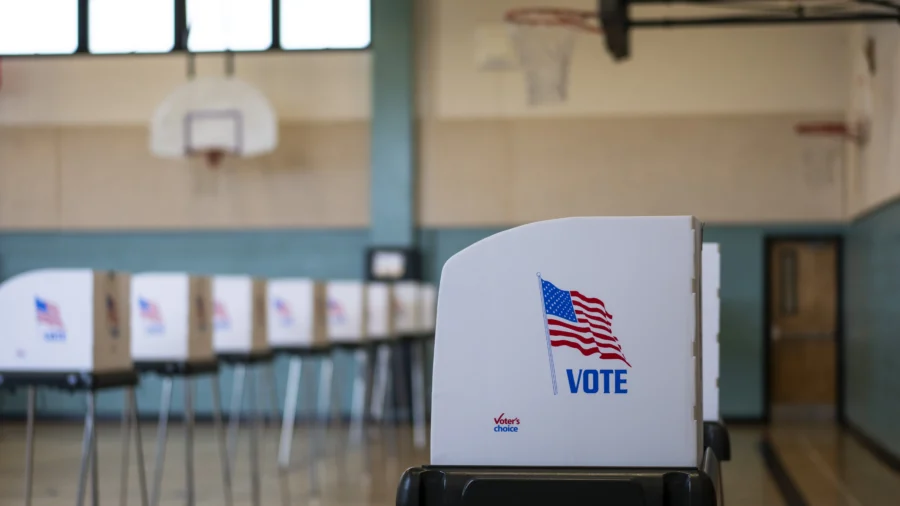On May 14, three states—Maryland, Nebraska, and West Virginia—held primary contests for Democrats and Republicans.
On the presidential level, the contest was largely uneventful, despite some warning signs for both former President Donald Trump and President Joe Biden.
In other races down-ballot, the results were largely predictable, with a few unexpected shake-ups.
Here are the top takeaways from the May 14 primary battles across the United States.
Warning Signs for Trump and Biden
As the 2024 election fast approaches, election night revealed some warning signs for both President Trump and President Biden.
As expected, both men won their primaries. But they also brought home a lower portion of the vote than they’d like.
Despite dropping out of the race on March 6, former United Nations ambassador Nikki Haley’s name remains on the ballot. Since dropping out, she’s continued to rack up a double-digit share of the vote even though President Trump is the presumptive nominee.
That trend continued in all three primaries on May 14.
In establishmentarian Maryland, Ms. Haley won her largest vote share. At the time of publication, she had 20 percent support to President Trump’s 80 percent.
In Nebraska, she got 18.1 percent.
She received her lowest support in West Virginia, where only 9.4 percent cast their ballots for her.
President Biden had the same problem.
He’s received harsh criticism from his party’s left flank for his handling of the war in Gaza, a trend that has intensified as anti-Israel protests have rocked college campuses across the nation.
In Maryland, with 66 percent of votes counted, President Biden had only 86.3 percent of the vote, while 10.4 percent of Democrats voted “Uncommitted,” and others voted for Marianne Williamson or Rep. Dean Phillips (D-Minn.).

In Nebraska, 9.9 percent voted for Mr. Phillips with more than 95 percent of votes counted.
In West Virginia, President Biden received just 70.5 percent of the Democrat vote.

It’s unclear if these protest votes will carry over to the general election, or if they’re simply an expression of condemnation against the presumptive nominees.
Alsobrooks Win Sets Up Hogan Showdown
The most surprising victory of the night came in Maryland’s U.S. Senate Democratic primary, where Prince George’s County Executive Angela Alsobrooks handily defeated Rep. David Trone (D-Md.).
The Associated Press (AP) called the race for Ms. Alsobrooks less than two hours after polls closed. At the time of publication, Ms. Alsobrooks is leading with 53.8 percent to Mr. Trone’s 42.1 percent with 65 percent of the vote.
On the Republican side former Maryland Gov. Larry Hogan, a popular Republican governor in the dark blue state who served two terms, was nominated by the GOP. AP called the race for him less than 30 minutes after polls closed.

The two are now set for a November showdown that will see Democrats facing their toughest general election opponent in decades in the Old Line State, which last sent a Republican to the Senate in 1980.
The result wasn’t surprising on the Republican side. However, Ms. Alsobrooks’ massive victory over a well-known congressman in the state was.
Her double-digit lead is a sharp contrast to some polls that suggested a double-digit lead for Mr. Trone.
The victory was all the more surprising due to Mr. Trone’s massive investment in his campaign.
The owner of Total Wine & More, Mr. Trone poured tens of millions of his own cash—roughly $60 million—into the campaign, a funding advantage that far exceeded Ms. Alsobrooks’ resources.
Ms. Alsobrooks is seen as more of a left-wing progressive than Mr. Trone. That contrast could be a problem for some voters.
Retired psychologist Sam Bass, 70, told The Epoch Times that he and his wife would consider holding their noses and voting for Mr. Hogan if Ms. Alsobrooks won the Democratic primary.
“The fact that Alsobrooks has all the endorsements of the entire political machine, I immediately find suspect,” Mr. Bass said.
Others, like Josh Getto, a 35-year-old engineer, told The Epoch Times that they felt Mr. Trone was more electable.
Republicans Poised to Lock Down West Virginia
West Virginians, meanwhile, elected nominees for a slate of state and federal offices. Republicans are poised to solidify their hold in a state that, as recently as a decade ago, was dominated by Democrats.
On the state level, the big prize was the nomination for governor.
Patrick Morrissey was the ultimate winner, edging out a series of state dynasts for the job, including Sen. Shelley Moore Capito’s (R-W.Va.) son, Moore Capito, and Rep. Carol Miller’s (R-W.Va.) son.
West Virginians also made their picks for the state’s two congressional districts.
The biggest of the state’s primaries was the battle for the Senate GOP nomination, which was handily won by West Virginia Gov. Jim Justice over Rep. Alex Mooney (R-W. Va.).

With Sen. Joe Manchin (D-W.Va.) not seeking a fourth term as West Virginia’s last statewide-elected Democrat, Republicans are heavily favored to win his seat, one held by Democrats since 1958.
Though the state once was controlled by Democrats, since the turn of the millennium it’s veered increasingly toward the Republican camp.
By 2020, West Virginia had become the second most Republican state in the country, behind only Wyoming.
For Republicans who won their primary battles tonight, the election is practically already over.
Many, if not all, the Republicans here will face little to no Democrat opposition in the fall in a state they once dominated, as recently as a decade ago.
Now, with Mr. Manchin out of the picture, West Virginians seem poised to send an all-GOP contingent to Washington in 2025 for the first time since 1921.
Bacon Beats Trump-Adjacent Dan Frei
Incumbent Rep. Don Bacon (R-Neb.) took the GOP nomination for Nebraska’s second congressional district, a swing district that could decide the outcome of the 2024 election.
Mr. Bacon bested challenger Dan Frei, a Trump-adjacent businessman and former U.S. Air Force F-16 fighter pilot, by around 25 points.
Mr. Bacon’s moderate brand of Republicanism is likely what kept him on the ticket in the very purple second district, which encompasses Omaha and which, in 2020, awarded its single electoral vote to President Biden.
Now, he faces a tough rematch with state Sen. Tony Vargas, who lost to Mr. Bacon by less than three points in 2022.
Election watchers say the second congressional district could impact what is expected to be an extremely close 2024 presidential race.
Nebraska is one of two states that award electoral college votes proportionally. In Nebraska, the overall winner receives two of the state’s five electoral votes. Each of the remaining three votes is given to the winner of each of the three congressional districts.
Nebraska began the practice in 1996. Since then, it has split its vote twice: in 2008 and 2020. Both times, the Second District supported the Democrat candidate.
A New York Times/Siena College poll released Monday shows President Biden trailing in five states and tied with President Trump in a sixth.
After changes in Electoral College apportionments since 2020, if President Trump were to win all the states he carried then and flip Arizona, Georgia, and Nevada, he would have only 268 of the 270 votes needed to win.
Nebraska’s fifth vote would produce a 269–269 tie, leaving the outcome for the U.S. House to decide.
Jackson Richman contributed to this report.
From The Epoch Times.

